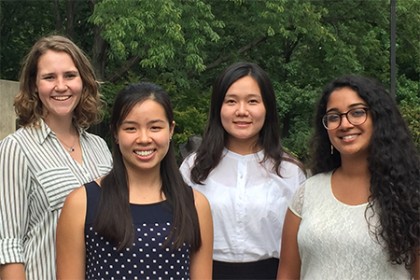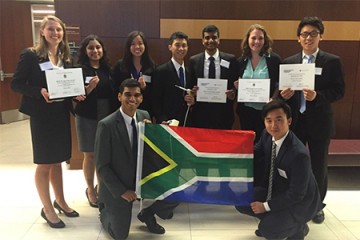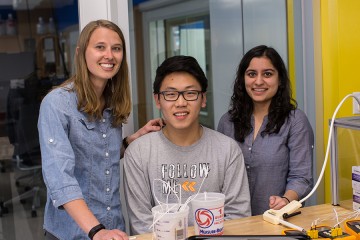A reusable cryotherapy system that could bring low-cost breast cancer treatment to women in rural South Africa has won the bronze prize for a Johns Hopkins University biomedical engineering team in the undergraduate category of the 2016 National Collegiate Inventors Competition. Prize winners were announced Friday at an event in Washington, D.C.

Image caption: The Cryoablation team who competed at the Collegiate Inventors Competition includes (from left) Bailey Surtees, Sarah Lee, Yixin Clarisse Hu, and Serena Thomas.
The Johns Hopkins Cryoablation team, one of five undergraduate finalists in the contest, has been working for more than a year on a reusable freezing device tool to kill breast tumors. The system is being developed for rural women who now forego treatment because of family responsibilities, along with the time commitment and travel costs associated with traditional cancer care at a distant regional hospital.
The bronze prize comes with $2,500 to be shared among the student inventors and a $500 award for the team's faculty adviser, Nicholas Durr, an assistant professor and undergraduate program director of the Center for Biomedical Engineering Innovation and Design. CBID is based in the Department of Biomedical Engineering, which is shared by the university's School of Medicine and its Whiting School of Engineering.
Bailey Surtees, the Cryoablation student team leader a senior biomedical engineering major from Edmond, Oklahoma, said she was excited to attend the competition and meet with other student inventors and prominent engineers. Surtees also said her team members are anxious to continue to refine their system and move it closer to real-life use in rural villages where access to medical care is limited.
"It's just so exciting to see this happening," Surtees said. "We're really seeing that this could make a real difference in some rural women's lives."
The project originated last year when radiologist Susan Harvey, director of breast imaging at the Johns Hopkins School of Medicine, began looking for ways to expand access to breast cancer diagnostics and treatment in rural South Africa. Harvey brought the challenge to CBID, where it was selected by an undergraduate student team.
Harvey worked with the team on alternatives to South Africa's most common breast cancer treatments, which involve anesthesia, surgery, and up to three weeks in a regional hospital. For many rural women, the travel costs and time away from work and family obligations make this treatment impractical.
As an alternative, Harvey suggested the students work on different method treatment: using a probe to freeze and kill the cancer cells. To keep the costs low, the student team members are working with reusable probe tips and a less expensive freezing gas—carbon dioxide—in their prototype system. The project was originally named Kubanda, which means "cold" in Zulu.
In addition to Surtees, the other current Johns Hopkins student team members are Yixin Clarisse Hu, Sarah Lee, Tara Blair, Serena Thomas, and Sean Young. Previous team members include Monica Rex, Nikhil Yechan Kang, Lonza Alwin Hui, Sonia Trakru, Ben Lee and Sanjay Elangovan.
Student teams from the University of Virginia and Columbia University won first and second place, respectively.









